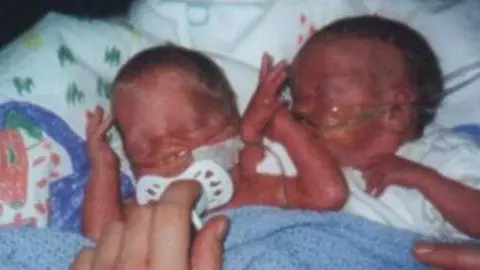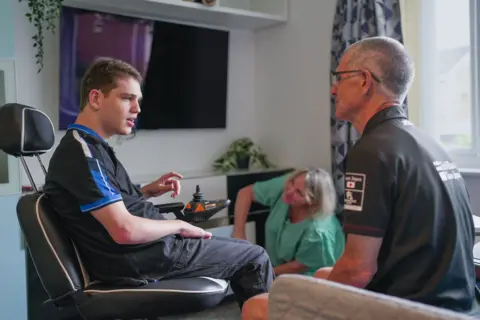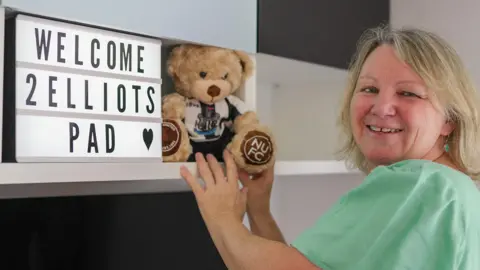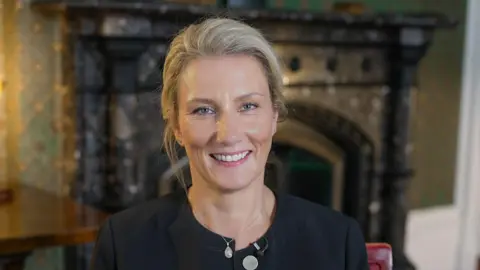Many disabled young people written off - report
 BBC
BBCToo many young people with additional needs are being "written off" and told they can never succeed, a government report has found.
Young disabled people were fully capable of thriving in work with appropriate support, the House of Lords Public Services Committee said.
Elliot Caswell, 25, from Newcastle, said he had faced continued frustrations in his desire to live and work independently and said people got "forgotten about". BBC News has followed his story for five years.
The Department of Health and Social Care (DHSC) said it was investing £18m until March 2025 in supported internships for those aged 16-24 with special needs or disabilities.
The report found disabled people faced continuous barriers to securing long-term employment, which began from when they first started nursery school.
Innovative and exceptional services did exist, it found, but there was a lack of resources, aspiration and expertise.
Some employers were also doing outstanding work but too many people faced discrimination, the report said.
The report's author, Baroness Estelle Morris, said: "What happens in general is people think problems. So it’s what they can’t do and their expectations, they can’t possibly do that, it’s too difficult, it will take too much effort.
"So I think it’s almost a cultural change. I wouldn’t say for a minute that that alone would bring about the improvements we want.
"But however much we spend, if it’s built on a system where too many people think it won’t work and it can’t be done, we will never make the progress that we need to make."
 Family handout
Family handoutIn the BBC’s film, Newcastle United fan Elliot, then aged 19, said: "My goal in life is to live independently, with friends in supported living, in accommodation not far from St James' Park and to get a job and contribute to society.
"Like other people with disabilities, this comes with extra challenges.
"It's not great sitting at home on the benefits system because that's not a way to live your life. You need to get out there and do some work and meet people."
Elliot and his twin brother Lewis were born prematurely at 26 weeks. Both boys had bleeds on the brain causing cerebral palsy. For Elliot, this affected all four of his limbs and Lewis's right side was affected.
Mum Chris Caswell said: "I just want both of them to be happy in what they're doing, to have friends that they can meet with and go out with, and for Elliot to live away from home, because we are realistic, we are older parents and we're not going to be here forever."
But their journey has been very different. Lewis went to university and now lives in a house share with a job, while Elliot's path has been more difficult.

He graduated from National Star College in Cheltenham in 2022 and at the time was looking forward to "more independence and more responsibility to feel what the real world is like". He hoped to be accepted on to an NHS apprenticeship scheme part-time.
But there were delays finding suitable accommodation and work, which Mrs Caswell said was "very disappointing".
Under his Education Care and Health Plan (ECHP), Elliot was entitled to full-time education until he was 25, but problems finding him suitable work experience meant his time with Project Choice at Gateshead College has been extended until Easter 2025.
Since 2022, he has taken part in four separate work experience placements, with another at North Tyneside Council due to start soon.
Overall, 25 organisations were contacted in a search for placements but were not found to be suitable for Elliot’s needs, either by the local education authority or his parents.

He waited two years for suitable living accommodation and a care package.
During that time, he was offered six places, with either his family or the occupational health team finding them unsuitable.
The council said it had worked with the family at their pace and in line with their wishes and ambitions to find the right home.
Rather than his dream of living with friends and working part-time, he is now in supported accommodation with a non-verbal man in his 60s.
But he is delighted to finally have the keys to his own place and his care package means he has one-to-one support and can socialise with his peers.
Elliot said: "You get forgotten about because there is a crisis in the care sector."
His father Jonathan said: "He's desperate to succeed, he's desperate to be engaged in meaningful working activity and he's been let down."

CEO of National Star College, Lynette Barrett, said many young adults had "no clear transition plan" for where they would live and what they would do when they left full-time education.
She said many ended up in inappropriate living situations and in the worst-case scenarios, some saw declining health and died.
"That may seem really dramatic, but that happens and it really brings into question the human rights of somebody with a disability to make the same choices as any other young person would at that age," she said.
"We shouldn’t be in a situation where they are having to fight so hard for the basic things in life that they need in order to be able to live a fulfilled life."

North Tyneside Council said it was "delighted" Elliot had found a suitable home and would continue to work with him to find suitable work placements.
Director of adult services, Eleanor Binks, said: "We work with partners to support our residents who have more complex needs, like Elliot. We work together to provide housing, and opportunities to gain skills, experiences and confidence to live and work independently.
"We recognise that we don't always get this right, but we do listen and care for each individual and will continue to work to adjust their care to meet their needs."
She added that the health and social care sector was facing challenges that could only be overcome with system change and better connections between services.
A DHSC spokesman said: "Every young person should be able to access the support they need to thrive in life, and this government is committed to tackling the significant challenges facing social care to ensure everyone is able to fulfil their potential, and live an independent, dignified life.
"As part of this, we will build a National Care Service based on consistent national standards and delivered locally."
